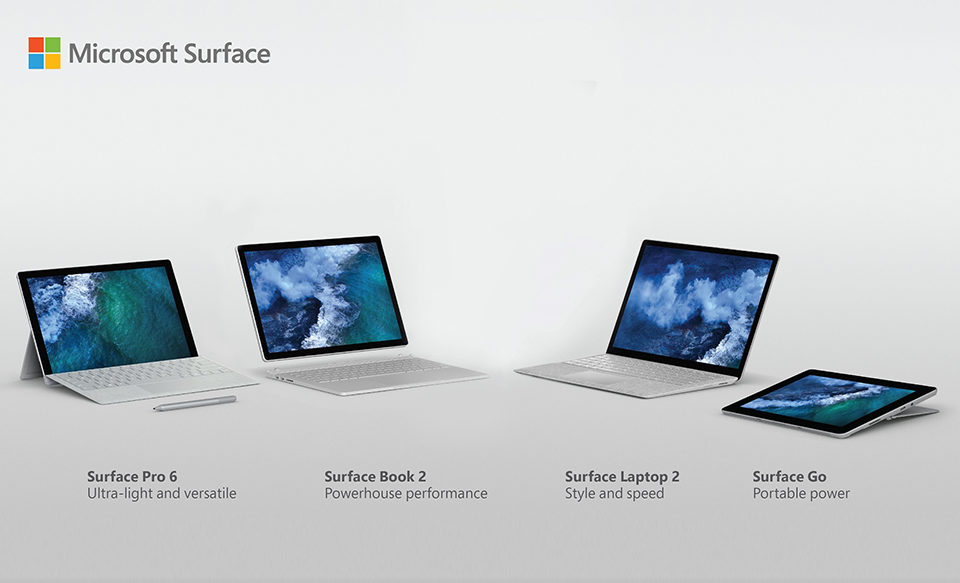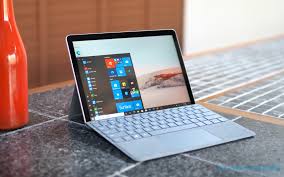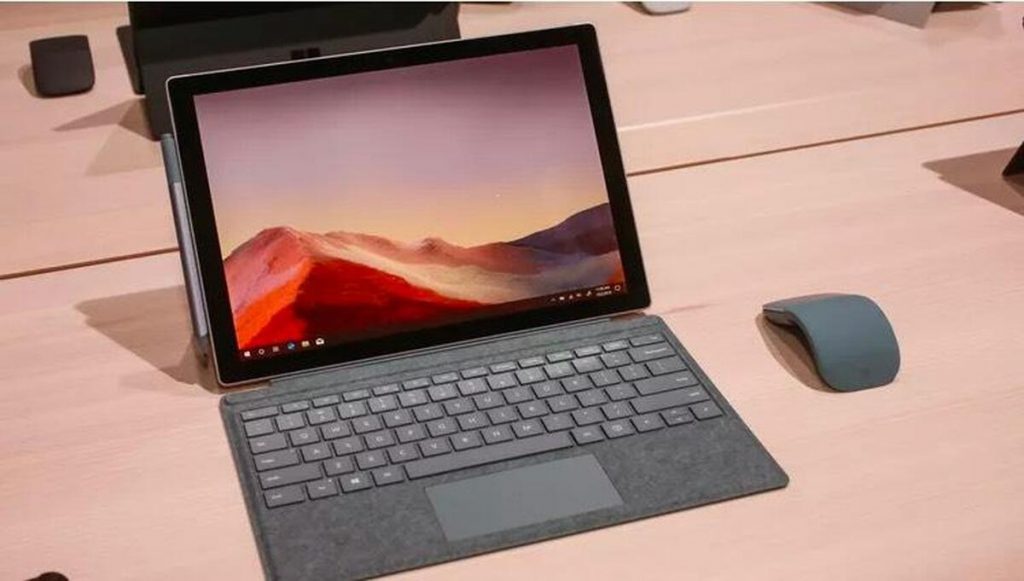
Microsoft offers six different devices within its Surface portfolio: the Surface Pro, Surface Pro X, Surface Laptop, Surface Book, Surface Studio, and Surface Go 2.
This lineup doesn’t include the business-orientated Surface Hub interactive whiteboard for corporates, or the upcoming Surface Neo due in 2021 or the new Android-based Surface Duo.
Confused about which one might be the one for you? No worries. It’s not as complicated as it first seems, and to help you figure out the differences between them all we’ve compared each of the Surface devices to give you a better idea of which is best for you.
Quick summary
The Surface Go 2 is a brand new 10.5-inch touchscreen tablet that, at first look, looks like a smaller Surface Pro, but it’s a little more portable and has less powerful processors – as Intel Core m3 and Pentium Gold. Microsoft is targeting Apple iPad users and Chromebook users with this device, as it’s the smallest Surface available and the cheapest. The original Surface Go (which has a 10-inch screen) is still available at present.
The Surface Pro 7 is a Windows 10 Pro 2-in-1 PC with a detachable keyboard, but it’s definitely not for people who want a conventional laptop. It retains the same design as the last few generations but the internals have been updated including Intel’s 10th generation Core processors.
The Surface Pro X is a look at a more premium 2-in-1. It’s designed for always-on connectivity and includes cellular connectivity thanks to its platform developed by Microsoft alongside Qualcomm.
The Surface Laptop 3 is a traditional clamshell laptop, still with touchscreen. It’s available in 13.5 and 15-inch versions and is an upgraded version of the Laptop 2, with new internals including Intel’s 10th generation Core processors. Like the Surface Pro 7, it also had USB-C for the first time.
The Surface Book 3 is a professional-grade laptop available in 13.5 or 15-inch sizes. What makes it stand out, however, is its detachable screen that can act as an independent tablet PC. There’s also the option of a discrete GPU. It’s bigger and more expensive than the Surface Laptop, but it offers more in terms of performance.
The Surface Studio 2 is the most expensive Surface device, and it’s primarily for creatives. It’s a gorgeous high-end all-in-one Windows 10 PC with a Zero Gravity Hinge. With a light push, it can be pushed down to a desk position and then used with the included Surface Pen or even the optional Surface Dial to sketch.
Which Microsoft Surface is best for you?
Microsoft Surface Go 2 – Check Price

- Dimensions: 245 x 175 x 8.3 mm, 544g weight
- Display: 10.5-inch PixelSense display; 1,920 x 1,280 resolution (220ppi), 3:2 aspect ratio
- Connections: 1 x USB-C, 3.5 mm headphone jack, 1 x Surface Connect port, Surface Type Cover Port, 1 x MicroSDXC Card Reader
- Battery: Up to 10 hours
- Accessories: Type Cover, Surface Dial and Surface Pen (all sold separately)
The Surface Go is the entry-level Surface. It’s based around either an Intel Pentium Gold or Intel Core m3 processor. It isn’t performance-orientated, but it is capable of running most desktop Windows apps.
There’s two models of the Surface Go available, with 4GB of memory/64GB of storage or 8GB of memory alongside 128GB of storage. There’s also a USB-C (non-Thunderbolt) port, a Surface Connect port for charging and a micro SD expansion slot under the kickstand.
That built-in kickstand can extend up to 165 degrees, while there’s a 5-megapixel Full HD camera (with support for Windows Hello), and rear auto-focus 8-megapixel Full HD camera. Both models work with the Surface Pen and really do need that as well as the Surface Type Cover, both of which add to the cost substantially.best Microsoft Surface laptop
The Surface Go Type Cover comes in standard black (plastic), or you can get it in Alcantara fabric in the following colours: Burgundy, Cobalt Blue, or Platinum. The Surface Go 2 itself only comes in a single colour – Platinum.
Microsoft Surface Pro 7 –Check Price

- Dimensions: 292 x 201 x 8.5mm, from 775g
- Display: 12.3-inch PixelSense display; 2,736 x 1,824 resolution (267ppi)
- Connections: 1x USB-C (not Thunderbolt), 1x USB-A, microSD card reader, Type Cover port, Surface Connect, 3.5mm headphone jack
- Battery: Up to 10.5 hours
- Accessories: Surface Pen, Signature Type Cover, Surface Dock (all sold separately)
The Surface Pro is a Windows 10 Pro 2-in-1 hybrid laptop. It’s not for people who want a conventional laptop.
The Surface Pro 7 is a very small upgrade over the previous Surface Pro 6 relatively-speaking which in turn was pretty similar to the Pro 5. It’s basically the same but with upgraded 10th generation Intel Core processors.
Also, USB-C is also introduced in place of the mini DisplayPort, but Microsoft hasn’t binned the Surface Connect port – we’ve absolutely no idea why. But we guess there is some continuity with older Surface devices.
It’s available in Platinum and Matte Black. Surface Pro works with a detachable Type Cover and Surface Pen, as well as the Surface Dock that transforms it into a desktop PC that can be used with two external monitors, mouse and printer.
Microsoft Surface Pro X – Check Price
- Dimensions: 287 x 208 x 7.3 mm, from 774g
- Display: 12.3-inch PixelSense display; 2,880 x 1,920 resolution (267ppi)
- Connections: 2 x USB-C (not Thunderbolt), Surface keyboard port, Surface Connect, nanoSIM
- Battery: Up to 13 hours
- Accessories: Surface Slim Pen and Surface Pro X keyboard, Surface Dock (all sold separately)
A brand new type of Surface, the Surface Pro X is more premium than the Surface Pro 7 in that it is a little thinner and features always-on connectivity (you’ll need a data-enabled nano SIM). It isn’t any lighter, however, and has a similar display. It also features dual USB-C ports but no headphones jack (there is, of course, Bluetooth).
But it has some drawbacks – its Microsoft and Qualcomm developed SQ1 processor will lack some of the out-and-out performance of the Surface Pro 7’s top-end Core i7 chips. And it’s an ARM-based device just like a smartphone and that means not all apps are compatible even though it runs full Windows 10 Home.
Microsoft Surface Laptop 3
We check 1,000s of prices on 1,000s of retailers to get you the lowest new price we can find. Pocket-lint may get a commission from these offers. Read more here.
- Dimensions: 308 x 223 x 14.5mm, 1.25kg weight (13.5-inch), 339.5 mm x 244 mm x 15 mm, 1.54kg (15-inch)
- Display: 13.5 or 15-inch PixelSense display; 2,256 x 1,504 or 2,496 x 1,664 resolution (both 201ppi)
- Connections: 1 x USB-C, 1 x USB-A, Surface Connect, 3.5mm headphone jack
- Battery: Up to 11.5 hours
- Accessories: Surface Arc Mouse, Surface Dock, Surface Dial, Surface Pen (all sold separately)
The Surface Laptop 3 is a standard clamshell laptop but it does have a bit of flair, offering an Alcantara fabric keyboard on some models, while there’s a black finish to add to the existing platinum, burgundy and cobalt blue.
These days there’s now a 15-inch version as well as the original 13.5-inch. The screen is terrific and there’s a superb spec sheet, too. As with Surface Pro 7 there are upgraded internals, with 10th generation Intel Core processors and USB-C in place of the mini DisplayPort.
The pleasant-feeling Alcantara fabric keyboard surround is only available on the 13.5-inch in platinum and cobalt blue. The 15-inch is available in platinum and matte black.
Microsoft Surface Book 3
- Dimensions: 13.5-inch: 312 x 232 x 13mm to 23 mm, from 1.53kg in weight or 15-inch: 312 x 232 x 13 to 23 mm, from 1.9kg in weight
- Display: 13.5-inch PixelSense display; 3,000 x 2000 resolution (267ppi) or 15-inch PixelSense display; 3,240 x 2,160 resolution (260ppi)
- Connections: 2 x USB 3.0, 1 x USB Type-C, Full-size SD card reader (SDXC), Mini DisplayPort, Surface Connect, 3.5mm headphone jack
- Battery: Up to 17.5 hours
- Accessories: Surface Pen, Surface Dial, Surface Dock 2 (all sold separately)
The Surface Book 3 a high-powered, touchscreen professional laptop, thanks to its solid base and a discrete GPU option. It comes in both 13.5 and 15-inch versions. It has a clever trick up its sleeve; the entire display detaches to become a fully-independent Windows tablet.
It’s the right Surface for anyone that needs a mobile workhouse that’ll last all day, though it isn’t cheap.
You can choose from Intel Core i5 or i7 processors and also configure the Nvidia GeForce GTX 1650 or GTX 1660 Ti discrete GPUs depending on the model. You can also have 256, 512GB or 1TB of storage.
All models have Windows Hello face authentication, a 5-megapixel front camera, 8-megapixel rear camera, dual microphones and front-facing stereo speakers with Dolby Audio Premium.
Microsoft Surface Studio 2
- Price: From $3,499 on Microsoft US
- Dimensions: 637.4 x 438.9 x 12.5mm (display), 250 x 220 x 32.2 mm (base), 9.56kg weight
- Display: 28-inch PixelSense display; 4500 x 3000 resolution (192dpi)
- Connections: 4 x USB 3.0, 1 x USB-C, Full size SD reader (SDXC), Mini DisplayPort, 3.5mm headphone jack
- Battery: Power cord with grip-release cable
- Accessories: Surface Pen (included); Surface Dial (sold separately)
The Surface Studio 2 features beefed-up core specs but the same design as the original Surface Studio. It’s not a portable machine, instead the Surface Studio is an all-in-one performance PC along the lines of the iMac but with a pivoting display that means the device can almost fold flat on the desk.
There’s a solitary USB-C port in this version thankfully (why is Microsoft so down on including USB-C?). There’s a seventh-generation Core i7 under the hood this time around but it’s the graphics that have been given a serious boost with Nvidia’s Pascal-based GTX 1060 and 1070 GPUs featuring 6 or 8GB of GDDR5 memory.

